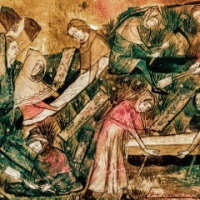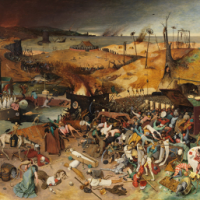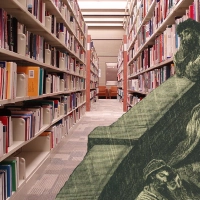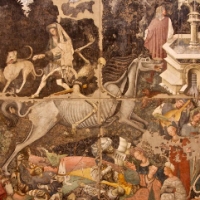October is Archives Month…and the National Archives are Closed
Throughout the year it is not uncommon to hear that a given month has had a the privilege of having a certain cause or subject attached to it. October, for example, is Archives Month (or more accurately American Archives Month in the parlance of the Society of American Archivists). During this month Archives big and small, across the US, will be organizing all manner of events; however, this year there is a certain bleak irony to this fact, for due to the government shutdown (ongoing as of this writing) which may well stretch through the entire month of October, the National Archives are closed. Or to state this in the clearest of terms, during American Archives Month (2013) the National Archives of the United States are inaccessible.
Granted, for many people this information may be met with something of a shrug (one can suppose that such people are not furloughed employees of the National Archives). While many may find the ongoing shutdown ridiculous and eagerly await the moment when it finally ends, there are some parts of the government that have been shut down that seem – honestly – more worrisome than others. After all, it’s surely bad that the National Archives are closed, but is it as bad (as potentially threatening to life) as the furloughs ravaging the Center for Disease Control or the Environmental Protection Agency?
To attempt to answer that question one first needs to be able to answer a separate question, namely: what is an archive? A simple, if not inaccurate definition, is that an archive is a collection of materials of ongoing historic value (and an archive may also be the term for the building where such materials are held); ideally within an archive these historic materials will be cared for and made accessible in such a way that they are preserved for posterity; as well as maintaining them so that these documents from the past are available to interested parties in the present. Another simple way to think of archives is that they are to historical documents and materials what libraries are to books. Archives are repositories for history, and thus simply by being included in an archive, materials achieve a level of importance as their preservation is a statement that “these things matter for history.”
That archives may advance certain historical biases is a not particularly outlandish claim. After all, archives are filled with the records that have been preserved, and the records deemed important, and from whence do many of these items, these documents, come? According to the philosopher Simone Weil (writing in The Need for Roots):
“documents originate among the powerful ones, the conquerors. History, therefore, is nothing but a compilation of the depositions made by assassins with respect to their victims and themselves,” (Weil, 222)
Lines which have a certain resonance with Walter Benjamin’s claim (from the Theses on the Philosophy of History) that:
“there is no document of civilization which is not at the same time a document of barbarism. And just as such a document is not free of barbarism, barbarism taints also the manner in which it was transmitted from one owner to another,” (Benjamin, 256)
Yet – despite the sunny disposition of Weil and Benjamin – it may be the case that archives (at least some archives) are attempting to wrestle with this challenge: from the Lesbian Herstory archive, to the numerous collections related to the Civil Rights movement, to labor archives, and so forth. Though the existence of many of these archives serves as a testament to the degree to which these voices/groups had previously been excluded from the “valued history” at other archives.
It is true that archives tell an incomplete, often biased story (for which the archivists should not receive all of the blame), and it is true that often times archives can actively attempt to tell a story in a rather one-sided way (see: presidential libraries). Archives are not without problems in their presentation of history, yet the troubled history presented by archives is nevertheless our history as well. It may be that the documents in a given archive present the history of powerful individuals with whom you have nothing in common, but the actions of those individuals have molded (or mutilated) our world into the shape that it is. We are challenged to understand what goes on around us in the here and now, but it is nearly impossible to do this if we are unable to confront and analyze the past that brought us to this juncture. At their best archives allow individuals to face history directly, to view the materials of “historic” figures without the gilded frame put around them by history books (archives are certainly frames, but they tend to be less gilded [have you seen archival stacks? {yeesh}]).
Through an honest reckoning with the past (which includes all of its cobwebs and bloodstains) our present takes on an understandable shape, and it is when we are broken from our past, when we are confused about history, that current times become all the more senseless. As Weil wrote:
“Loss of the past, whether it be collectively or individually, is the supreme human tragedy, and we have thrown ours away just like a child picking off the petals of a rose.” (Weil, 117)
In Weil’s view a lack of contact and understanding of history led individuals and their entire societies to become “uprooted,” and for new “roots” to be grown it is essential for people to reencounter and reclaim their history, as Weil writes (with disarming frankness):
“No other method exists for acquiring knowledge about the human heart than the study of history coupled with experience of life, in such a way that the two throw light upon each other. It is our duty to supply this food to the mind of youth, the mind of Man. But it must be a truth-giving food. Facts must not only be correct, so far as one is able to verify them, but must be shown in their true perspective relative to good and evil.” (Weil, 229)
Archives (along with museums and libraries) provide this important societal space, they allow history to speak (sometimes speaking through the omitted voices), and they challenge us in the present to see past occurrences in “their true perspective” and hopefully to therefore see current events in “their true perspective.” A people without knowledge of history – though history may simply be a list of barbaric acts and trampled hopes – is a people without a knowledge of themselves.
When the government shuts down it becomes more important than ever to understand the historical mechanisms that have brought on such a moment, that have informed the various actors in the debacle, and to show the ways that groups in the past have prepared to take care of one another in the face of venal power. It may seem like the closing of the National Archives – due to the government shut down – represents one of the less dire consequences…but in fact it may be amongst the worst. Luckily, the National Archives does not represent the only archives – and does not represent the broadest range of voices on history – and though the National Archives may be shut an archive near you is open.
For, you cannot effectively speak out in this moment in history, unless you are willing to seek out history.
Works Cited
Benjamin, Walter. Illuminations. Schocken, 2007.
Weil, Simone. The Need for Roots. Routledge Classics, 2002.












Reblogged this on Adithya Entertainment.
In danger of veering into managerialisms, even if archives are more important than ever, they lack the urgency of activities such as disease control. I suppose that abandoning disease control in favour of archives does yield stories about death and suffering that future generations should know about. But then, you’re surely not setting up your examples into an opposition as though we should be forced to decide between them, are you? I mean, being in the UK, I wouldn’t know, but has anyone seriously suggested this? Sounds like an interesting punch-up. And if the archives win, could the disease controllers and environmental protectors help out?
(in case it’s not absolutely clear, this reply might be a tad mischievous!)
Discourse that doesn’t have room for mischief is bland, so thank you for injecting some “mischievous” challenges. Indeed, archives are less important to life and limb than, say, disease control, environmental protection, or monitoring the skies for asteroids with nefarious intentions. Yet – in the spirit of archives month – the above post was aiming to remind folks (mainly in the US) that the National Archives (as well as the Library of Congress) have also been victims of the shutdown. I’m not suggesting that the choice is between funding the National Archives and funding the Center for Disease Control, and if one has to pick between the two, the latter seems more sensible.
Yet there is something darkly amusing about the National Archives being close during Archives Month. And as US politics continue to devolve, one cannot help but wonder about those who do not learn from history…
Thanks for your comment!
Pingback: What Will 2014 Bring for Libraries? | LibrarianShipwreck
Pingback: Libraries – Destruction and Pillage (Canadian Edition) | LibrarianShipwreck